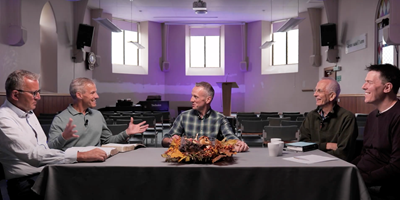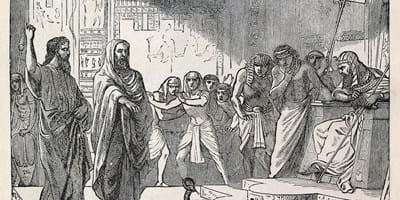“Peter asked Jesus, ‘What about him, Lord?’ Jesus replied, ‘If I want him to remain alive until I return, what is that to you?’” (John 21:21,22 NLT).
There are certain characters in the Bible whom I find easier to relate to than others; Peter is one. The verse above concludes a hard conversation the Lord had with him after he had failed terribly in the hours leading up to the crucifixion. Despite having been graciously restored by Christ and promised an important role in shepherding the early church, Peter can’t help but wonder aloud how his companion’s duties and destiny would compare to his. Aren’t we often guilty of the same? We know that God has generously given us everything we have – abilities, possessions, spouses, physical appearance, children – but we can’t help looking out of the corner of our eye at someone else. Why can’t I be more like her, Lord? Sound familiar? Me too! I’ve found when I get into a vicious cycle of comparing it can result in several “curses”.
Curse 1:Ungrateful
Nothing can ruin the end of a nice outing better than my children saying, “But can we just have . . .?” When I refuse what they’re lusting for there is an inevitable sulk, after which I remind them to be grateful for all the lovely things they did get, instead of focusing on the one thing they didn’t. I really need to take my own advice! When I start comparing myself to others around me, I’ll soon spot something I want – be it her looks, her cooking ability, or her well-behaved, seemingly grateful children – and fixating on that can make me quickly forget the many blessings God has given me; none of which I deserve, and all of which I should be continually thanking Him for! Like the old saying goes, comparison really is the thief of joy. Let’s combat this curse, as Paul advises, by “giving thanks always and for everything to God the Father” (Ephesians 5:20 ESV).
Curse 2: Judgemental
Whenever we sense a gap between ourselves and others our human instinct is to close it, often by dragging them down. We are quick to spot small faults or shortcomings and persuade ourselves they accomplish more because they have it easy – less children, more money, no work pressures, plenty of help, etc. The truth is we know nothing about the successes of others, or how hard won they were, beyond what we can observe externally (and those observations may be skewed if social media is the lens through which we’re viewing them!). Romans challenges:
“Why do you pass judgement . . . Why do you despise your brother? For we will all stand before the judgement seat of God” (Romans 14:10 ESV).
How dare I judge when only God can truly assess us based on what He’s given us and what’s in our hearts? And do I scrutinise my own life to the same degree? Matthew reminds us that we will be judged using the same measure we use (Matthew 7:1,2) and the writer to the Hebrews warns, in chapter 12, that a “root of bitterness” that produces this kind of thinking causes trouble. The same passage however gives a solution:
“Strive for peace with everyone . . . See to it that no one fails to obtain the grace of God” (Hebrews 12:14,15 ESV).
Curse 3: Defeatist
Finally, and this is probably my own biggest tendency, we just give up. We think we’re useless and that everything we do is being done better by someone else, so why bother? We’re convinced our problems would disappear if we were someone else or somewhere else. Again, the apostle Paul shows us this isn’t a new problem:
“For the body does not consist of one member but of many . . . if the ear should say ‘Because I am not an eye, I do not belong to the body,’ that would not make it any less a part of the body. If the whole body were an eye where would be the sense of hearing . . . But as it is, God arranged the members in the body, each one of them, as He chose” (1Corinthians 12:14,16-18 ESV, emphasis mine).
The verses above teach plainly that God has carefully and thoughtfully arranged each individual member of the body that is His church. He has made me the person I am and placed me alongside particular individuals for a purpose. I can try and avoid them (perhaps a reason why some of us enjoyed lockdown more than we’d admit) or claim I’d fare better if I was somewhere else but is there a chance the problem is not really from without but within? Perhaps the biggest reason I’m not at peace with others is I’m not at peace with myself and the lot God has given me? Whilst there are examples of those who were graciously permitted to cry out to God about their circumstances (e.g., Job) the Bible makes it clear that questioning God’s perfect design and plan is not a stance He takes lightly. In the case of Job, God’s answer prompted him to realise afresh just how sinful he really was. So, let’s cry out to God; but be prepared that His answer, if He gives any, may well be a humbling one and not the removal from our situation we were hoping for.
So, if God won’t change my situation or my “self”, how then do I rectify this, perhaps most problematic, of the “curses” of comparison? I need to gratefully accept that God has, in His good will, fearfully and wonderfully made me just as I am (Psalm 139). This will take continual prayer and repeated grounding in His truth when I find myself tending toward introspection. For it’s when I’m disgruntled with who I am and searching for who I want to be that I am at risk of seeking for answers in the wrong places. This world will offer many ways to “find yourself” but only God’s Word will tell me who I truly am and correct me when I lose sight of it. After all, it is full of examples of others who were insecure and flawed, and yet were reminded by Christ that He loved them and had a plan for them. Which brings us back to where we started – with Peter. Christ’s words to him are short, sharp and still relevant to those of us afflicted, as he was, by comparison’s curse:
“what is that to you? You follow me!” (John 21:22 ESV).
The best advice when I’m tempted to look around is instead to look up. He is the only person truly worth emulating, and growing in likeness to Him will bring true satisfaction, for in the light of His glory all other comparisons fade.































